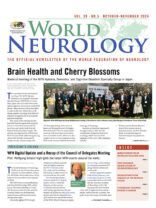An Australian high school student celebrates World Brain Day 2024.

Sarah McPartland
By Sarah McPartland
I was inspired by Prof. Tissa Wijeratne, co-chair of World Brain Day, to develop a template for how our school community could raise awareness about the 10 vital steps (“Life’s Ten”) to good brain health through the “Brain Health and Prevention” campaign. This initiative served a dual purpose: educating our student body and uniting us in a fun and meaningful way to not only learn but also raise funds for this important cause.
As school captain, I brought this idea to our student senate meeting, and I was thrilled by the overwhelming support from my fellow students and the senior staff within our leadership team. We’ve since created a poster that will be displayed throughout the school leading up to the events we’ve planned.
Brain health is crucial for laying the foundation for future well-being. Simple preventative steps, like eating healthy or getting enough sleep, can protect young brains from cognitive decline and neurological conditions later in life. By establishing these good habits now, our generation can enhance our learning abilities and improve our quality of life as we age.
Every weekend, I visit my grandfather, who suffers from vascular dementia and Alzheimer’s disease. Seeing others in his senior care facility who are unable to speak or move without a nurse’s assistance has deeply affected me. Knowing that we can equip the next generation with proactive and practical ways to prevent such a decline in quality of life motivates me. This knowledge has the potential to significantly reduce the number of individuals facing cognitive decline in the future.
Our goal is to pioneer brain health education within our school by implementing a Brain Health Week. Each day of this week will focus on two of the 10 essential steps for maintaining healthy cognition. We want to ensure that students understand these steps and can apply them practically in their daily lives. These steps will support their learning, decision making and long-term cognitive health.
The week will culminate in a pajama day fundraiser on Friday, highlighting the importance of adequate sleep as a preventative measure. The funds raised will be donated to a brain health charity, allowing students to not only learn how to maintain good brain health themselves but also contribute to research aimed at preventing cognitive decline.
Through these efforts, our leadership team hopes to empower students to maintain optimal cognitive function throughout their lives. •
Sarah McPartland is year 12 school captain of Melton Christian College in Melton, Victoria, Australia.
